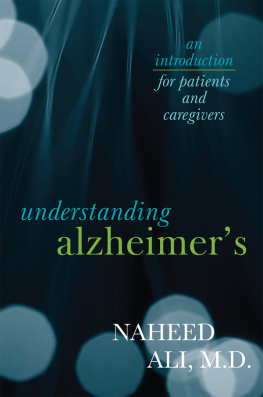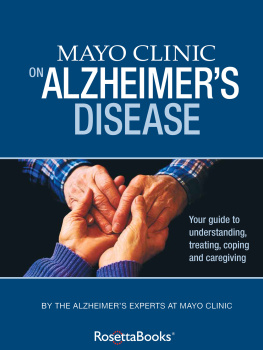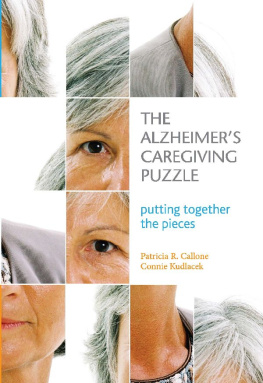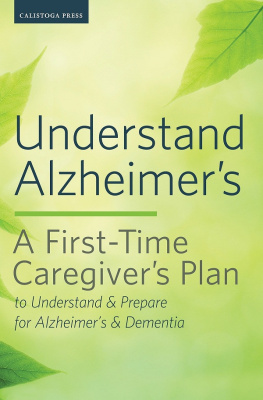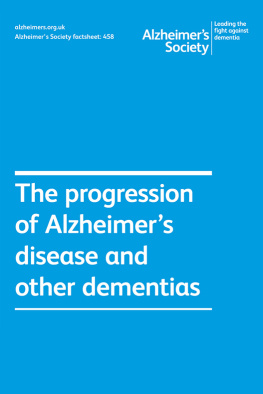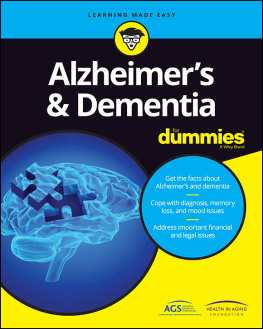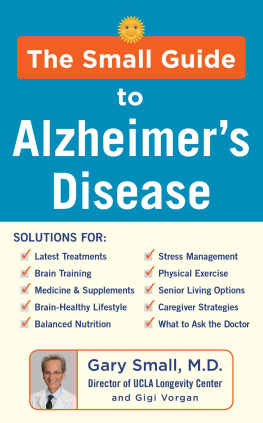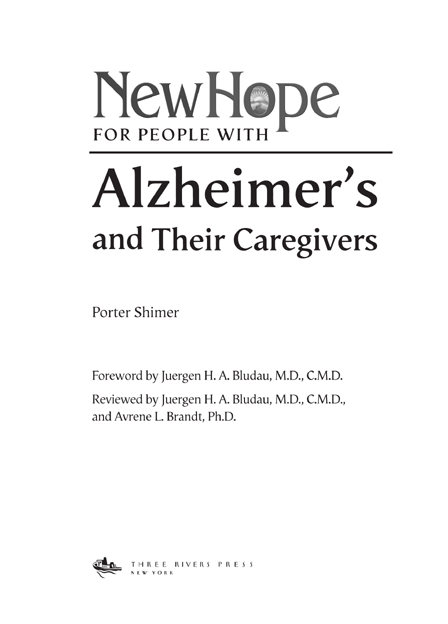Other Books in the N EW H OPE Series
New Hope for People with Bipolar Disorder
New Hope for People with Borderline Personality Disorder
New Hope for People with Depression
New Hope for People with Diabetes
New Hope for People with Fibromyalgia
New Hope for People with Lupus
New Hope for People with Weight Problems
Copyright 2002 by Prima Publishing, a division of Random House, Inc.
All rights reserved. No part of this book may be reproduced or transmitted in any form or by any means, electronic or mechanical, including photocopying, recording, or by any information storage or retrieval system, without written permission from Random House, Inc., except for the inclusion of brief quotations in a review.
Published by Three Rivers Press, New York, New York.
Member of the Crown Publishing Group, a division of Random House, Inc.
www.crownpublishing.com
THREE RIVERS PRESS and the Tugboat design are registered trademarks of Random House, Inc.
Originally published by Prima Publishing, Roseville, California, in 2002.
In order to protect their privacy, the names of some individuals cited in this book have been changed.
WarningDisclaimer
This book is not intended to provide medical advice and is sold with the understanding that the publisher and the author are not liable for the misconception or misuse of information provided. The author and Random House, Inc., shall have neither liability nor responsibility to any person or entity with respect to any loss, damage, or injury caused or alleged to be caused directly or indirectly by the information contained in this book or the use of any products mentioned. Readers should not use any of the products discussed in this book without the advice of a medical professional.
Interior design by Peri Poloni, Knockout Design
Illustrations by Laurie Baker-McNeile
Library of Congress Cataloging-in-Publication Data
Shimer, Porter.
New hope for people with Alzheimers and their caregivers: your friendly, authoritative guide to the latest in traditional and complementary treatments / Porter Shimer.
p. cm.(New hope)
1. Alzheimers diseaseTreatmentPopular works. 2. Alzheimers diseasePatientsCarePopular works. I. Title. II. Series.
RC523.2 .S538 2002
616.83106dc21
2002066343
eISBN: 978-0-307-80922-3
v3.1
This book is dedicated not just to the millions of
people with Alzheimers disease, but also to the
millions more responsible for their care.
Contents
Foreword
D AY IN AND day out, Alzheimers disease touches every aspect of the life of both the person with the illness and the caregiver, many times impacting the caregivers physical and mental health radically. The reality is, the caregiverwhether he or she is a spouse, adult child, relative, or friendis the single most challenged, misunderstood, and ignored participant in the care and treatment of a person with Alzheimers disease. In this book, Porter Shimer gives caregivers a guide for their journey along the bumpy, winding, and ever-changing road of dealing with a person who has Alzheimers. From choosing the right physician to investigating traditional and alternative therapies, Shimer focuses on supplying caregivers with the essential information and tools necessary to navigate the appropriate course for themselves and the loved ones in their care.
The caregiver is the all-important link between the patient and physician. In fact, it is the caregiver who ultimately provides the physician with the most valuable insights and information necessary to reach a diagnosis. It is also the caregiver who makes it possible for his or her loved one to stay in a comfortable home environment for as long as possible, as well as providing support to the medical and nursing staff of a long-term care facility. Unfortunately, the caregiver is often left out of the most crucial decisions and meetings, resulting in a sense of inadequacy, frustration, and overall loss of control. While we search for treatment options and, eventually, the ultimate cure for this devastating disease, we must first and foremost never forget the caregiver.
All the medications, tests, and advances in treatment are of no use if we dont accurately diagnose the disease in the first place, and in many cases this is only made possible by carefully listening to the caregiver; something many physicians fail to do.
I often equate this to a pediatrician diagnosing a 3-year-old without any input from the parent or caregiver. Obviously, this is not the treatment method chosen by pediatricians. Why, then, do physicians treating Alzheimers disease continue to ignore their most valuable resource for proper diagnosis and treatment? We must look at geriatrics as a mirror image of pediatrics.
Following the diagnosis, identifying the treatment, care, and emotional needs of both the patient and his or her caregiver is crucial. Even more important, the entire health care team must include the caregiver as an essential partner. This allows the caregiver to feel comfortable making decisions for the loved one as the disease progresses and their lives change and evolve.
It is my belief that until we have a cure for Alzheimers, we must have caregivers! This book provides the information, the insight, the compassion, the hope, and the guidance that all those with the important but difficult job of caring for someone with this disease need.
Juergen H. A. Bludau, M.D., C.M.D.,
medical director, Joseph L. Morse Geriatric Center
and the Institute for Geriatric Research & Training
Acknowledgments
M Y SINCERE THANKS to the following people for making this book possible: Juergen Bludau, Avrene Brandt, Colleen Brooks, Vicky Cahan, Jamie Clark, Wanda Cochran, Martin Diorio, Morris Friedell, Laura Gitlin, Diane Grandstrom, Gail Hamilton, Glenn Hammel, Ann Jones, Daniel Kaufer, Claire Kowalchik, Daniel Kuhn, William Li, Penny Martin, Daryl Miller, Dawn Nelson, Ronald Podell, Paul Raia, Michelle Ritholz, Roger Rosenberg, Jennifer Rovenski, Rick Shaw, Elizabeth Shimer, W. R. Shimer, Gary Small, Andrew Smith, Rudolph Tanzi, Myron Weiner, Ernestine Williams, and David Winston.
Introduction
W HEN RONALD REAGAN announced he had Alzheimers disease in November 1994, 5 years after the completion of his second term in office, the illness went from relative obscurity to worldwide prominence in the brief time it took the former president to deliver his speech. I now begin the journey into the sunset of my life, Mr. Reagan said, and with those words a journey began for all of us toward a better understanding and appreciation of this difficult disease.
The Great Communicator had done it again, this time alerting the world to an illness with potential for becoming one of the most pressing health problems of the twenty-first century.
Unsustainable is the word David Banks of the Food and Drug Administrations Office of Special Health Issues has used to describe the costs Alzheimers disease could impose on the U.S. health care system in the years ahead if allowed to continue at its present pace. Already the medical costs of Alzheimers disease (AD) are $100 billion a year, making the illness our third most costly malady behind only heart disease and cancer. These costs should be considered meager, however, compared to what theyve been projected to be as increasing numbers of us succeed at extending our life spans, Banks says. Our odds of developing Alzheimers reach 1 in 10 by the age of 65 and increase steadily until they are almost 1 in 2 at age 85.


